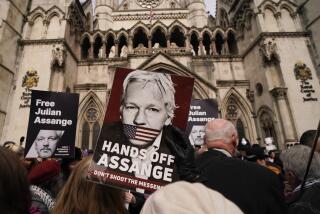Poll: Should Edward Snowden, the NSA whistle-blower, go to jail?
Anyone who exposes truly sensitive government secrets can be reasonably certain to have his or her identity revealed eventually (see, e.g., Daniel Ellsberg or Bradley Manning). So it made a certain amount of sense for Edward J. Snowden to announce over the weekend that he was the one who blew the whistle on the National Security Agency’s classified and extraordinarily broad surveillance program.
I mean, why spend sleepless nights worrying about being discovered when it’s just a matter of time? Might as well drop the veil and get on with the fight to stay out of jail.
Snowden has relocated to Hong Kong, hoping to avoid facing the music in the United States. He’s almost certain to be indicted for something; the documents he released to the Guardian newspaper in London and the Washington Post include a classified court order and two top secret PowerPoint decks. The Obama administration has already referred the case to the Justice Department, and a spokesman for Director of National Intelligence James Clapper said, ominously, that “the intelligence community is currently reviewing the damage that has been done by these recent disclosures.”
Reaction has been predictably mixed and extreme, with Fox News analyst Ralph Peters calling for Snowden to be executed and previous national security whistle-blowers, Ellsberg included, practically calling for a statue to be erected in his honor. Some cyber civil libertarians argue that the revelations should cause heads to roll within the administration because they appear to have lied to Congress about the surveillance; the Electronic Frontier Federation wants Congress to appoint a blue-ribbon panel to “conduct a full, public investigation into the domestic surveillance of Americans by the intelligence communities ... [and] make changes in the law to stop the spying and ensure that it does not happen again.”
One interesting question, though, is whether Snowden is entitled to protection as a whistle-blower. The administration argues that its data-gathering efforts on phone networks and online have all fallen within the bounds of the Patriot Act and the Foreign Intelligence Surveillance Act. In fact, the hoovering of data from phone companies has been done under the auspices of regular orders from the Foreign Intelligence Surveillance Court. If that’s true -- and granted, that’s a sizable “if” -- Snowden has disclosed things that the government has been doing legally.
On the other hand, it’s impossible to have a real discussion of the pros and cons of government data-mining if it’s all done in secret. President Obama has said we should have a national conversation about how to balance privacy and security, but the issue wouldn’t be on the table if not for Snowden.
But what do you think? Take our dangerously unscientific poll, leave a comment or do both.
ALSO:
Gay rights: Why marriage matters
Stay calm and let the NSA carry on
Sen. Sessions on immigration bill’s broken promises
Follow Jon Healey on Twitter @jcahealey
More to Read
A cure for the common opinion
Get thought-provoking perspectives with our weekly newsletter.
You may occasionally receive promotional content from the Los Angeles Times.







